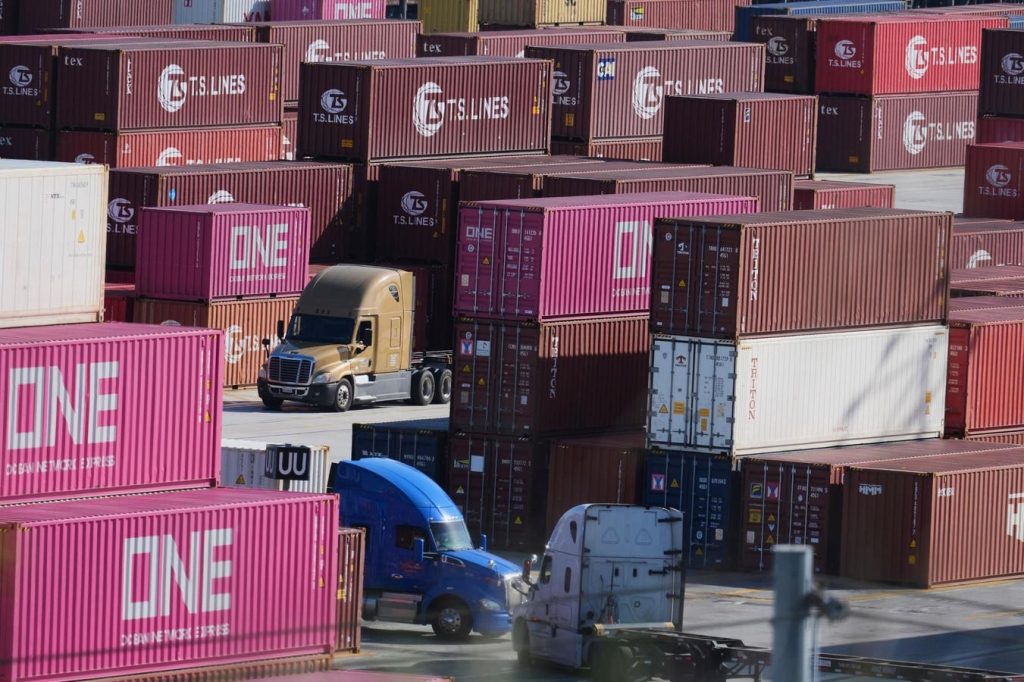Containers are stacked at the Port of Los Angeles Wednesday, April 2, 2025, in Los Angeles. (AP … More
President Donald Trump’s executive order sets up even more tariffs calculated on a reciprocal basis. The administration’s Wednesday decision has created a tit-for-tat trading policy for U.S. interactions with virtually the entire world as well as a 10% base tariff on imports.
Their theory stands in sharp contrast with decades of international trade and geopolitical practices and policies. Economists and experts in foreign policy, trade, and business are warning that this approach could be disastrous and potentially land the country in significant stagflation, in which the economy would see a major slowdown, inflation would rise, and unemployment might also head upward.
Reality Of Trade Deficits
Trade deficits will always happen. The chances of two countries having equal value in what they can sell to or buy from the other are pretty slim. This protectionist approach — it’s part of the economic theory is called mercantilism — is, on reflection, unrealistic.
If you own a business and need to purchase inventory from a supplier, you can’t reasonably assume that the vendor will purchase from your business at least as much as you buy from them. That is especially true when you may offer goods or services they don’t need, or even if they did buy some, it wouldn’t be at the volume you expected.
Think of a vast company that purchased materials to create plastic wrapping for the toilet paper it made. Can the vendor of that material really use the equivalent amount of toilet paper? If consumers go to the grocery store for weekly food shopping, could they all expect to cover the cost of their purchases with sales to the store?
Reality Of U.S. Trade Deficits
If the U.S. trades with a country and pays in dollars, as it’s likely to do, is anyone considering whether a large portion of that money gets reinvested here?
The U.S. has had trade deficits for many decades, as the graph from the Federal Reserve Bank of St. Louis shows below. (The more negative the number, the higher the U.S. trade deficit.)
U.S. negative trade balance over time
Is there too much outsourcing? Perhaps. Should there be more domestic manufacturing to ensure supply chains? It might be a good idea. However, this trend continues to coincide with the U.S. economy being the largest in the world. Perhaps there is far less disaster in the mercantilist view of the world.
Cost Of Reciprocal Tariffs
China and other parts of the Asia Pacific region, Europe, large portions of South America, and the rest of North America have strongly condemned U.S. actions as an unreasonable overturning of global order, as Reuters has reported. Most if, not all, are planning countermeasures.
Two experts from GlobalData.TSLombard — Steven Blitz, managing director, global macro, and chief U.S. economist, and Grace Fan, managing director, global policy research and disruptive themes research — addressed the new situation in a post. They estimate that the $530 billion in tariffs imposed by the new policy is also equivalent to a 1.8% tax on GDP, 8.4% tax on consumer goods spending, 18% tax on manufacturing GDP, and a 77% tax on manufacturers’ profits. “Not a mild stagflationary event, this is a recession-producing turn — if these tariffs stay in place,” they wrote.
Capital market participants — the big lenders and liquidity providers that lubricate global economies, “are repricing against Trump breaking the trade/dollar contract that has ruled for 40 years,” they added. Those who buy U.S. debt, a necessity in a country that has indulged in so much deficit spending, will likely require higher return on U.S. dollar assets, including higher interest rates for the national debt, which already requires more than $1 trillion annually for debt service.
As of around 2:00 p.m. on Thursday, the S&P 500 was down 4.26%. The Dow Jones Industrial Average lost 3.39%. The Nasdaq was off 5.45%. The Russell 2000, associated with smaller businesses, dropped 5.91%.
Here Comes More Inflation
As Blitz separately wrote, inflation is likely to get worse when “the huge inflow of foreign capital that has been boosting the Treasury market slows in line with the narrower trade deficit – notably in Q3 when Treasury financing ramps back up.”
Reuters reported that the cost of an iPhone, for example, could jump to $2,300 with increased costs to Apple of 30% to 40%, assuming the company would pass on all the cost to consumers. It might not, and suppliers could also eat part of the increase. But still, significantly higher prices would be almost inevitable.
“Tariff increases in the second Trump administration likely amount to a roughly 25% tax increase on the $3.3 trillion of U.S. annual goods imports, equivalent to a tax hike of 2%-3% of U.S.,” wrote Bill Adams, chief economist for Comerica Bank, in an emailed note on Wednesday. “That’s equivalent to more than doubling the effective federal corporate tax rate.”
There are already signs that the economy is about to drastically slow, possibly begin shrinking toward what would become a recession. If that happens, it’s reasonable to expect jobs to be cut and unemployment rates to rise.
“What’s really at stake is trust — America’s long-standing reputation as a stable and predictable destination for global investment,” wrote Bedassa Tadesse, professor of economics at the University of Minnesota, Duluth. “And once that trust is lost, it’s incredibly hard to win back.”

